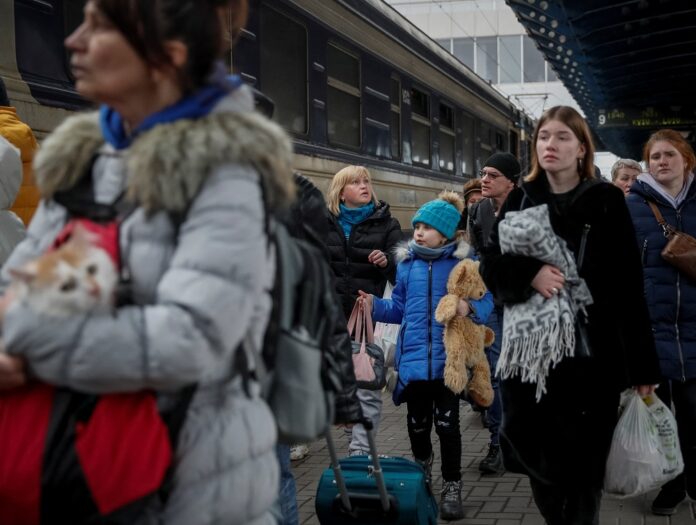People with children from Kyiv’s Central Children’s Hospital board an evacuation train from Kyiv to Lviv at Kyiv central train station amid Russia’s invasion of Ukraine, in Kyiv March 7, 2022. — Reuters pic
WASHINGTON, March 9 — Russia said it is ready to provide humanitarian corridors today for people fleeing Kyiv and four other Ukrainian cities, as the number of refugees created by the biggest assault on a European country since World War Two surpassed 2 million.
Mikhail Mizintsev, head of Russia’s National Defence Control Centre, was quoted as saying by the Tass news agency that Russian forces would “observe a regime of silence” from 10am Moscow time (0700 GMT) to ensure safe passage for civilians wishing to leave Kyiv, Chernihiv, Sumy, Kharkiv and Mariupol.
It was unclear if the proposed routes would pass through Russia or Belarus, conditions previously opposed by the Ukrainian government.
Civilians fled the besieged city of Sumy yesterday in the first successful “humanitarian corridor” opened since Russia’s invasion. Ukraine accused Russian forces of shelling another evacuation route, from Mariupol in the south of the country.
A US ban on imports of Russia’s oil sparked a further increase in the oil price. Prices have surged more than 30 per cent since Russia invaded its neighbour on February 24. O/R
Russia — the world’s second-largest exporter of crude — has warned the cost will skyrocket further if the West implements bans.
Despite the prospect of higher household bills, US President Joe Biden said Russian President Vladimir Putin needed to face consequences for the assault.
“The American people will deal another powerful blow to Putin’s war machine,” he said.
The Kremlin describes its actions as a “special operation” to disarm Ukraine and unseat leaders it calls neo-Nazis. Ukraine and Western allies call this a baseless pretext for a war of choice that has raised fears of wider conflict in Europe.
Adding to Russia’s global isolation, McDonald’s, a symbol of capitalism that opened in Russia as the Soviet Union fell, and coffeehouse chain Starbucks will temporarily close stores, while Pepsi will stop selling its soft drink brands and Coca-Cola is halting business in the country.
Western countries are walking a fine line between using harsh sanctions to stop the war as quickly as possible, while also protecting their fragile economies from rising inflation.
The conflict and ensuing sanctions have played havoc with global supply chains, sending prices soaring not only for food and energy but also key raw materials like aluminium and nickel.
The London Metal Exchange was forced to halt trading in nickel — crucial for making stainless steel and electric vehicle batteries — yesterday as prices doubled to more than US$100,000 per tonne due to worries about Russian supply.
Britain said it would phase out the import of Russian oil and oil products by the end of 2022, while the European Union published plans to cut its reliance on Russian gas by two thirds this year.
People board an evacuation train from Kyiv to Lviv, at Kyiv central train station, amid Russia’s invasion of Ukraine, in Kyiv March 6, 2022. — Reuters pic
Polish planes
As Western military aid poured into Ukraine over the Polish and Romanian borders, the United States turned down a surprise Polish offer to transfer MiG-29 fighter jets to a US base in Germany to help replenish Ukraine’s air force.
The prospect of flying combat aircraft from Nato territory into the war zone “raises serious concerns for the entire Nato alliance,” the Pentagon said.
In the seaside Ukrainian town of Mariupol, people were fast running out of electricity, heat, food, and drinking water after more than a week of bombardment, the International Committee of the Red Cross said.
“The situation in Mariupol is apocalyptic,” Red Cross spokesperson Ewan Watson said.
Many tried to leave yesterday along a safe corridor but Ukraine’s foreign ministry said Russian forces violated a ceasefire and shelled it.
Moscow denies targeting civilians.
Russia opened a separate corridor out of the eastern city of Sumy. Buses left for Poltava further west, only hours after a Russian air strike which regional officials said had hit a residential area and killed 21 people. Reuters could not verify the incident.
Residents were also leaving Irpin, a frontline Kyiv suburb.
Elsewhere, Ukrainian troops repulsed a Russian attempt to enter the eastern city of Kharkiv on Tuesday and foiled a planned operation by 120 Russian paratroopers near the border, regional Governor Oleh Synehubov said.
Five people, two of them children, were killed late on Tuesday when Russian planes attacked the town of Malyn, northwest of Kyiv, and destroyed seven houses, the state emergency service said. Reuters was unable to corroborate.
Ukraine’s defence ministry said Vitaly Gerasimov, first deputy commander of Russia’s 41st army, was killed on Monday, the second Russian major general killed during the invasion. Russia’s defence ministry could not be reached for comment.
Within Russia, the war has led to a severe new crackdown on dissent, with the last remaining independent media largely shut last week and foreign broadcasters banned. — Reuters


